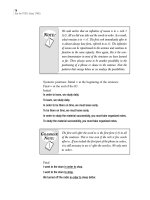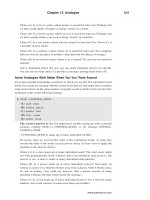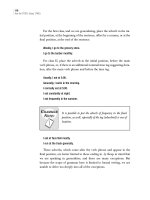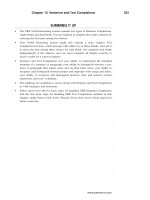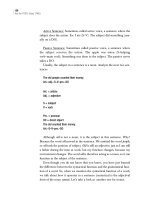Ace the GRE
Bạn đang xem bản rút gọn của tài liệu. Xem và tải ngay bản đầy đủ của tài liệu tại đây (11.1 MB, 163 trang )
5/2/07
5:23 PM
Page 1
ACE THE GRE WRITING ASSESSMENT
If you’re one of the 500,000 students who will take
the GRE this year, you know the stakes are high.
Your score can determine whether you get into your ideal
school, and the Writing Assessment is the hardest part of the
test—one that trips up many students.
Ace the GRE Writing Assessment gives you simple and clear
instruction on what you need to know to score well on the
toughest section of the test and provides real essay samples
that you can relate to. You’ll get the lowdown on what you need
to score high in an easy-to-understand format full of great tips.
INSIDE YOU’LL DISCOVER HOW TO HANDLE:
✔
❍
●
✔
❍
●
✔
❍
●
Analysis of arguments
Logic
Comparison/
contrast statements
✔
❍
●
✔
❍
●
✔
❍
●
✔
❍
●
Punctuation
Cause and effect essays
Transitions
and much more!
Don’t let the Writing Assessment stand between you and the
score you want. Ace the GRE Writing Assessment is the resource
you need to tackle the most challenging section of the GRE.
www.sourcebooks.com
ISBN-13: 978-1-4022-0842-3
ISBN-10: 1-4022-0842-1
EAN
Study Aids/Test Prep $14.95 U.S.
$19.95 CAN/£7.99 UK
UPC
cover
ACE
Everything You Need to
Score Higher on the GRE
GRE
THE
WRITING ASSESSMENT
.....................................................................................................................................................................
.....................................................................................................................................................................
.....................................................................................................................................................................
.....................................................................................................................................................................
.....................................................................................................................................................................
.....................................................................................................................................................................
.....................................................................................................................................................................
.....................................................................................................................................................................
.....................................................................................................................................................................
.......................................................................................................................................
BOOST YOUR GRE SKILLS ON:
✔ Punctuation
●
❍
✔ Cause/Effect
❍
●
✔ Analysis of Arguments
●
❍
✔ Plus Sample Essays
❍
●
✔ Transitions
●
❍
✔ Logic
●
❍
✔ Comparison/Contrast
❍
●
✔ And Much More!
❍
●
AVANTS
TIM AVANTS
Internals
4/9/07
5:46 PM
Page i
ACE THE
GRE
Writing Assessment
TIM AVANTS
Internals
4/9/07
5:46 PM
Page ii
Copyright © 2007 by Tim Avants
Cover and internal design © 2007 by Sourcebooks, Inc.
Sourcebooks and the colophon are registered trademarks of Sourcebooks, Inc.
All rights reserved. No part of this book may be
reproduced in any form or by any electronic or
mechanical means including information storage and
retrieval systems—except in the case of brief quotations embodied in critical articles or reviews—without
permission in writing from its publisher,
Sourcebooks, Inc.
Published by Sourcebooks, Inc.
P.O. Box 4410, Naperville, Illinois 60567-4410
(630) 961-3900
Fax: (630) 961-2168
www.sourcebooks.com
Printed and bound in the United States of America.
BG 10 9 8 7 6 5 4 3 2 1
Internals
4/9/07
5:46 PM
Page iii
To my lovely wife Berna
Internals
4/9/07
5:46 PM
Page iv
Internals
4/9/07
5:46 PM
Page v
Contents
1. Introduction to the Writing Assessment . . . . . . 1
2. Punctuation . . . . . . . . . . . . . . . . . . . . . . . . . . . . . . . . 5
The Comma . . . . . . . . . . . . . . . . . . . . . . . . . . . . 5
A. The Formal Rule . . . . . . . . . . . . . . . . . . . . . . 5
B. The Gut Rule. . . . . . . . . . . . . . . . . . . . . . . . . 7
Afterthought. . . . . . . . . . . . . . . . . . . . . . . . . . . 10
Appositive . . . . . . . . . . . . . . . . . . . . . . . . . . . . 11
Interjections . . . . . . . . . . . . . . . . . . . . . . . . . . . 12
Independent Clauses . . . . . . . . . . . . . . . . . . . 14
For. . . . . . . . . . . . . . . . . . . . . . . . . . . . . . . . . . . 15
Series of Things . . . . . . . . . . . . . . . . . . . . . . . 15
Sentence Fragments. . . . . . . . . . . . . . . . . . . . 16
Single-Word Phrases . . . . . . . . . . . . . . . . . . . 16
Descriptive Phrases . . . . . . . . . . . . . . . . . . . . 17
Semicolons . . . . . . . . . . . . . . . . . . . . . . . . . . . . . . 18
Independent Clauses . . . . . . . . . . . . . . . . . . . 18
Semicolon with a Series of
Independent Clauses . . . . . . . . . . . . . . . . . . . 19
Colon. . . . . . . . . . . . . . . . . . . . . . . . . . . . . . . . . . . 21
Dash . . . . . . . . . . . . . . . . . . . . . . . . . . . . . . . . . . . 25
Apostrophes . . . . . . . . . . . . . . . . . . . . . . . . . . . . . 26
Possessive of Irregular Nouns: . . . . . . . . . . . 27
Apostrophe with a Plural Phrase . . . . . . . . . . 27
Internals
4/9/07
5:46 PM
Page vi
Sentence Fragments . . . . . . . . . . . . . . . . . . . . . . 28
3. Transitions. . . . . . . . . . . . . . . . . . . . . . . . . . . . . . . . 31
4. Analysis of Argument. . . . . . . . . . . . . . . . . . . . . . 35
5. Patterns of Development . . . . . . . . . . . . . . . . . . 37
6. Logical Fallacies . . . . . . . . . . . . . . . . . . . . . . . . . . 41
Non Sequitur . . . . . . . . . . . . . . . . . . . . . . . . . . . . 41
False Analogy . . . . . . . . . . . . . . . . . . . . . . . . . . . . 41
Either/Or Fallacy. . . . . . . . . . . . . . . . . . . . . . . . . . 42
Circular Reasoning . . . . . . . . . . . . . . . . . . . . . . . 43
Begging the Question . . . . . . . . . . . . . . . . . . . . . 43
Ad Hominem. . . . . . . . . . . . . . . . . . . . . . . . . . . . . 44
Bandwagon Appeal . . . . . . . . . . . . . . . . . . . . . . . 44
Hasty Generalization . . . . . . . . . . . . . . . . . . . . . . 45
7. Inductive vs. Deductive Logic . . . . . . . . . . . . . . . 47
8. Sample Argument Questions and Essays . . . 49
9. Analysis of Issue . . . . . . . . . . . . . . . . . . . . . . . . . . 75
Pattern of Development . . . . . . . . . . . . . . . . . . . . 76
10. Comparison-Contrast . . . . . . . . . . . . . . . . . . . . 79
11. Sample Patterns of Development
Comparison-Contrast . . . . . . . . . . . . . . . . . . . . 83
12. Cause-Effect. . . . . . . . . . . . . . . . . . . . . . . . . . . . . 87
13. Division-Classification Sample Paper. . . . . . 91
Internals
4/9/07
5:46 PM
Page vii
14. Definition. . . . . . . . . . . . . . . . . . . . . . . . . . . . . . . . 95
15. Sample Essay Questions and Answers . . . . 99
Parting Thoughts. . . . . . . . . . . . . . . . . . . . . . . . . . . 145
Internals
4/9/07
5:46 PM
Page viii
Internals
4/9/07
5:46 PM
Page 1
CHAPTE R ON E:
Introduction to the
Writing Assessment
The following is designed to provide general information needed to make your Writing Assessment Test
pain free. The information includes procedures for
testing, assessment content, and various items that
will prove useful throughout the entire testing
process.
1. The Two GRE Writing Assessment components
2. The Official 250 Questions downloadable at the
ETS website
3. Procedures
4. Using the GRE Word Processor
5. The Scoring System for the GRE Essays
6. Score Reports
Internals
4/9/07
5:46 PM
Page 2
2
Ace the GRE Writing Assessment
The ETS has an official website where you can
download 250 official questions free: 125 for the Issue
segment and 125 for the Argument segment. The student receives a question at random during the test.
The site is located at www gre.org/writing.html.
Like most computer adaptive tests, the writing
assessment section will have a tutorial prior to the
beginning of the writing assessment. This will allow
you time to acquaint yourself with the computer.
Pencil and paper will be provided should you need to
make notes while you are writing. Once you have
completed the Issue section, you can move on to the
Argument section. However, once you exit the Issue
segment, you cannot return, even if you finished with
time remaining. In addition, there is no break
between the Issue and the Argument sections.
The testing system does not allow you to return to
either of the two essays once you’ve moved on. There
is no spell check, so be sure you check over your work.
Two different readers score each section of the
Assessment for a total of four readers. All of the
scores are averaged to make one score for the
Argument and Issue sections together. Let’s look at a
sample score.
Internals
4/9/07
5:46 PM
Page 3
3
Introduction to the Writing Assessment
Issue
Reader 1=3
Reader 2=3
Total=6
Argument
Reader 3=5
Reader 4=4
Total=9
The total of the Issue and the Argument sections
equals 15. Divide 15 by 4 (number of readers) and
that equals 3.75. The average would be rounded up to
a score of 4 on the Writing Assessment, because any
score over 50% is rounded up. Here, the 3.75 is over
the 3.5, so we rounded the score up to 4.
You will also receive a percentile rank. For
instance, a rank of 70% indicates that you scored
higher than 70% of the test-takers and 30% of test-takers scored higher than you.
Scores are mailed to you and to the schools in
about three weeks. Percentile rank is not reported to
the schools.
The schools determine how much weight that they
want to give to the scores of the Writing Assessment
when considering applicants to graduate school. You
should check with the school you want to attend prior
to taking the exam. Be advised, though, that many
schools will look at a high score on the Writing
Internals
4/9/07
5:46 PM
Page 4
4
Ace the GRE Writing Assessment
Assessment and allow that to offset a lower score on
the Quantitative section, especially if the student is
applying to a graduate program in the humanities,
such as English or Sociology.
Before we begin on particular test items, we need
to review some fundamentals of sentence structure
and punctuation to ensure success. Most often, I read
(as a college professor) excellent essays that only
receive a C because of punctuation mistakes that
cause problems with logic. These are most often
problems that could easily be avoided with an hour
of review.
Internals
4/9/07
5:46 PM
Page 5
CHAPTE R TWO:
Punctuation
The Comma
The comma is used to set off words, several-word phrases, or clauses. There are two basic rules I like to use
when determining when to put a comma in a sentence.
A. The Formal Rule
If you have an independent clause, and something
comes to the left of the subject, and it’s not an article,
and it’s not an adjective, set it off with a comma.
Example: On the way, [we stopped at the store.]
S—-V
Independent Clause (IC)
Internals
4/9/07
5:46 PM
Page 6
6
Ace the GRE Writing Assessment
The big boy ate the candy.
Art. -adj.-S—-V-art. -Direct Object (DO)
There is no comma in the second example, because
it does not follow the rule (the words before the subject
are an article[art.] and an adjective[adj.]). We said that
the clause must be an independent clause.
That means it must be able to stand by itself. If it
does not, it’s not an independent clause. If it’s not
independent, it’s either a sentence fragment or a
dependent clause. A dependent clause will usually
have a word at the very beginning of it that will make
it depend on another sentence to come after it to
complete the thought. For example:
When I was a boy, I ate candy
Dep. Clause (DC)—IC
The dependent clause usually has a subject and a
verb, and it is referred to as a subordinate clause. The
subordinator makes an independent clause dependent. Generally, a subordinator is usually a preposition: in, on, after, under, whenever, before, while,
among, next, toward.
Internals
4/9/07
5:46 PM
Page 7
7
Punctuation
Not all dependent clauses necessarily have a subject and verb, but, for the sake of discussion, we will
talk in generalizations. Therefore, although a clause
or phrase which comes before an independent clause
may not have both a subject and verb, we usually set
it off by using both rules described here.
Along the banks, fires were glowing.
Around the bend, a truck had crashed.
In December, we stay in the house. After dinner, we
ate dessert.
Up the coast, there were many sea gulls.
Under the table, the boy played carelessly.
B. The Gut Rule
Simply put, if there is no trauma, do not add a
comma.
I don’t want to oversimplify, but we can usually
look at the sentence and determine what is pertinent
information and what is extra. By doing this, combined with the formal rule, we can figure out where
to put the comma. For example:
Internals
4/9/07
5:46 PM
Page 8
8
Ace the GRE Writing Assessment
Today, I went to the store.
Yesterday, I went shopping.
The important information comes after the comma
in both sentences. It is not really important that the
person went to the store today. Simply the fact that he
went to the store is important. The same logic is true
with the second sentence. Now, if I want to make the
information of today just as important as the fact that
I went to the store, I will integrate that into the structure of the independent clause. For example:
I went to the store today.
I went shopping yesterday.
I want to eat chicken tonight.
Let’s view these sentences in how they are actually
spoken. If the time tag is at the beginning of the sentence, there will be a slight pause in the sentence
before I start to say the information in the independent
clause. This pause is a change in tone that leads me to
believe that I must include a comma. Note that the
tone goes down where the comma is inserted, and it
rises again after the comma in the independent clause.
Internals
4/9/07
5:46 PM
Page 9
9
Punctuation
Tone: ___________________________________
Today, I went shopping.
I went shopping today.
Tone: ___________________________________
Tone and stress are two different things. I can
stress a certain word, but that does not necessarily
mean that I automatically put in a comma. Likewise,
I now feel compelled to dispel a myth. Most of us,
and wrongly I might add, were taught to put a
comma in a sentence if we pause. Well, that’s not
always true. Following that logic, let’s look at an
example. Let’s assume that my wife saw me at the
store with a beautiful woman, and she asked me
about it after I made it home. Following the logic of
the rule we are usually taught in Elementary school,
we would punctuate my reply with the commas indicated. Keep in mind that I will choose my answer
very carefully to her question, because I will definitely live with my answer for the rest of my life.
Internals
4/9/07
5:46 PM
Page 10
10
Ace the GRE Writing Assessment
QUESTION:
Who was that woman you were with at the store?
ANSWER:
S,s,s,ss,hh,he,ee ii,i,is,s,s,ss mm,mm,yy
ff,f,ffr,rr,iiennd. (She is my friend.)
I hope you get my point. So, let’s forget about the
rule that we must always put in a comma if there is a
pause in a sentence. Let’s follow the rule below:
If there is no trauma, don’t add a comma.
We almost always need commas after transitional
phrases, which we’ve discussed before, because they
come before an independent clause (IC).
Afterthought
An afterthought needs to come after an IC. It signals
extra information, but at the end of a sentence. There
may be contention with a professor about the use of
commas in this regard, because only you can determine if the afterthought is actually extra information
or if it is, in fact, pertinent.
Internals
4/9/07
5:46 PM
Page 11
11
Punctuation
We sat down and ate candy, and old bread.
I saw the man with one arm, and also his dog
I ate the whole chicken, and then had dessert.
We played football, and basketball.
However, a sentence with one subject and two predicates (verbs) or two objects does not need a comma.
He ran and walked. He ate bread and cheese.
Appositive
An appositive commonly renames a noun, and commas usually set it off. The noun and the other phrase
renaming or describing it have reference in common,
one normally renaming another. Some appositives
are not set off, and these are called restricted, because
their address is only directed (restricted) to the noun
or its equivalent next to it. Again, restricted means
that one does NOT add any commas, because the
description is restricted or limited to the word or
phrase directly next to it.
Those set off with commas are nonrestricted.
Internals
4/9/07
5:46 PM
Page 12
12
Ace the GRE Writing Assessment
The fat boy, the one with the glasses, sat on my ice
cream.
I like sports, namely boxing, more than studying.
Her most outstanding characteristic, being nice,
brought her luck.
One thing, running, is better than most anything I
know.
The man, Jon, lit a smoke.
The General, Rommel, won the battle.
He bought her a gift for her birthday, a cruise.
The underlined words are the appositives. All the
underlined phrases rename or describe the noun
before it, except in the last sentence, where cruise
renames gift. Here, a cruise is an afterthought, so we
offset it with a comma.
Interjections
We said before that interjections interrupt. I also said
that they are utterly useless, and that is generally true,
at least in the context in which we saw them. But, an
interjectory phrase can be highly useful information,
but it is, nevertheless, extra. It can be a transition that
Internals
4/9/07
5:46 PM
Page 13
13
Punctuation
points direction of an argument, or it may comment
somehow. For example:
1. I think, however, life is good.
2. She said, convincingly enough, that she was
innocent.
3. I, oddly enough, feel tired.
4. He looked like, but I’m not sure, the man who shot
the dog.
EXPLANATIONS:
1. Here, however signals a change in the direction
of a conversation.
2. Convincingly enough comments on the subject
matter of the sentence.
3. Oddly enough comments on the content of the
message.
4. The clause but I’m not sure interrupts to give
extra information and comment on the content
of the sentence.
Internals THE
4/9/07
:
RE 5:46 PM
Page 14
14
Ace the GRE Writing Assessment
NOTE:
Because we have broken the structure of
the sentence, interrupted it, we must set
apart the interjections (phrases and
clauses) with commas.
Independent Clauses
When we join two independent clauses with a
comma, we must have a coordinating conjunction
connecting them. These words are coordinating conjunctions when connecting two independent clauses;
when moved in the superstructure, they may take on
different functions. Hence, the coordinating conjunctions are situated between the two Independent
clauses (ICs)
BOYFANS: But, Because, or, yet, for, and, nor,
neither, so
I went, but I didn’t enjoy myself.
I want money, because I’m hungry.
I will go to Egypt, or I’ll return home.
I ate, yet I’m still hungry.
Internals
4/9/07
5:46 PM
Page 15
15
Punctuation
For
Do not use this. It is somewhat archaic. He stayed
behind, for he was ill. For generally has the sense of
a causal relationship, but the indication of the relationship between the event in the first clause and that
in the second is more ambiguous than with the usage
of because. Plus, it is chiefly British English (Br.E.).
I walked a mile, and I lifted weights.
I won’t run, nor will I walk.
I don’t drink alcohol, neither does he.
[Notice the inverted word order in the second clauses with nor and neither.]
I drank coffee, so did he.
I wanted ice, so I went to the store.
Series of Things
When listing a series of things, commas are used
between sentence fragments, single-word phrases,
and descriptive phrases.
Internals
4/9/07
5:46 PM
Page 16
16
Ace the GRE Writing Assessment
Sentence Fragments
I went home, ate some food, walked the dog, and
went to bed.
I stayed up late, got up early, and worked out.
My son kicked the ball, cleaned the garage, and set
up the basketball hoop.
I said that the verb phrases were sentence fragments, because they all lack a subject. Therefore, they
can be linked by use of a comma. But, if they had
subjects, we would need to add a coordinating conjunction (c/c). They can be linked a different way,
which we will discuss later. Always look for the subject and verb when punctuating a sentence, and you
can determine how to set it up.
Single-Word Phrases
He sings, dances, and plays.
He bought an apple, a toy, paper, and a pen.
I saw Bob, Mary, and Ted.
